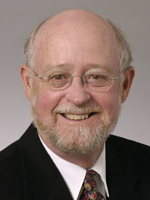Conference marking Witte retirement to explore issues in higher education
A Pulitzer Prize-winning historian will highlight a conference next month marking the retirement of longtime University of Wisconsin–Madison professor John Witte.

Witte
Taylor Branch, best known for his landmark narrative history of the civil rights era, “America in the King Years,” will speak on his research into college sports at noon on Saturday, June 9, at the Pyle Center, 702 Langdon St. He is part of a conference on “Issues for Universities in the 21st Century” that Witte organized as a farewell to his 40 years of teaching public affairs and political science.
Witte asked many of his former colleagues and students to participate in the conference by preparing papers on topics outside their normal research interests, but all focused on the future of higher education.

Branch
The conference, he says, will explore impact of more women than men enrolling in and graduating from higher education institutions, whether higher education faces a financial “bubble,” and whether higher education should be evaluated the same way public school kindergarten through 12th grade is evaluated.
“After 40 years of teaching, I wanted to find a suitable way to say thank you to my students and get them hooked on a new and critical area of future research — higher education,” says Witte. “What better way than by assembling some bright people to look at broad issues for our future and new ways to think about them?”
The featured speaker, Branch, won the Pulitzer Prize in 1989 for the first book in the King triology, “Parting the Waters: America in the King Years, 1954-63.” Two successive volumes also gained critical and popular success: “Pillar of Fire: America in the King Years, 1963-65,” and “At Canaan’s Edge: America in the King Years, 1965-1968.”
In 2009, Branch published “The Clinton Tapes: Wrestling History with the President,” an eight-year project to gather a sitting president’s comprehensive oral history on tape. Most recently he wrote “The Cartel: Inside the Rise and Imminent Fall of the NCAA,” which looks at the structure of college sports. Branch makes the case for paying college athletes — and reveals how a spate of lawsuits working their way through the courts could destroy the NCAA.
Branch began his career in 1970 as a staff journalist for The Washington Monthly, Harper’s and Esquire. He holds honorary doctoral degrees from 10 colleges and universities. Other citations include the Dayton Literary Peace Prize Lifetime Achievement Award in 2008 and the National Humanities Medal in 1999.
The conference, which runs from 9:30 a.m. to 4:15 p.m., is free and open to the public. A reception honoring Witte’s retirement will be held at 4:30 p.m., also in the Pyle Center.



